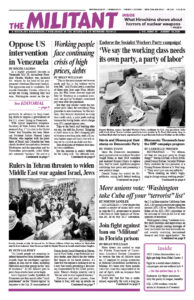In a highly polarized election in Venezuela July 28, incumbent President Nicolás Maduro was declared the winner by the head of the government’s National Electoral Council. The opposition and its candidate, Edmundo González Urrutia, refused to accept the ruling, claiming they had won. Washington seized on the opportunity to advance its long-standing drive to impose a government of the U.S. rulers’ liking in Venezuela.
With typical imperialist arrogance, Secretary of State Antony Blinken announced Aug. 1 “it is clear to the United States” that González had won. Mexican President Andrés Manuel López Obrador, who together with the presidents of Brazil and Colombia has been closely involved in negotiations between Washington and the opposition and the Venezuelan government, called Blinken’s statement “reckless.” He said it is not “legal or legitimate for any government to make a ruling declaring winner or loser a candidate in another country.”
This is precisely what the U.S. imperialist rulers always seek to do — impose themselves as the arbiter of “democracy” around the world, the better to use that image to justify their interventions abroad aimed at defending their economic and military domination.
Disputed results
Speaking at a meeting in Miami Aug. 4, Socialist Workers Party presidential candidate Rachele Fruit demanded “Washington hands off Venezuela!”
“The U.S. rulers have a long history of intervention in the affairs of the Venezuelan people. They have no business doing so.”
Maduro’s government and the National Electoral Council (CNE) reported that the president won with 5.1 million votes, to 4.4 million for González. Leaders of the opposition claimed its candidate received 6.2 million votes compared with 2.7 million for Maduro, winning by a margin of 3.5 million votes.
Thousands took to the streets in the capital, Caracas, and across the country the week after the vote in largely peaceful demonstrations calling on the CNE to release the voting tally sheets from every precinct. Protesters said its ruling is an attempt to steal the election. Some of the demonstrations took place in former bastions of working-class support for the ruling United Socialist Party of Venezuela (PSUV), the political party formed by Maduro’s predecessor and mentor, Hugo Chávez.
At the same time, tens of thousands marched Aug. 3 in support of the official results, protesting what the Maduro government says is a criminal far-right conspiracy to carry out a coup.
Leaders of at least 15 Latin American governments, and European Union representatives, have either questioned or not recognized the results of the election and joined in the call for the Maduro government to release the tally sheets as a way to move forward out of the crisis.
U.S. efforts to rein in Venezuela
After failures by previous U.S. administrations to forcefully remove the PSUV-led government, first under Chávez and then Maduro, the Joseph Biden administration engaged the Venezuelan government in talks last year. It sought to set parameters for the presidential elections, in which Washington offered an eventual lifting of punishing U.S. sanctions on the country’s oil, banking and gold industries. The cost was the Venezuelan government had to organize the election along lines acceptable to the U.S. capitalist rulers.
In addition to Washington’s sanctions on the government and economy, it also maintains sanctions on at least 115 high-ranking Venezuelan officials it claims carried out “criminal, antidemocratic or corrupt actions.”
Last year’s talks, held in Qatar and Barbados, resulted in the partial lifting of some sanctions that have been in place since 2019 crippling Venezuela’s crucial oil and gas industry. Washington reinstated them in April, accusing the Maduro government of failing to hold “free and fair elections” when the opposition’s leader, María Corina Machado, was blocked from running for president.
A court had upheld an earlier ruling by the Venezuelan general comptroller to disqualify her from holding office for 15 years after she called for foreign intervention in Venezuela at a meeting of the Organization of American States in 2014. She also has supported Washington’s sanctions against Venezuela and faces corruption charges involving Venezuelan assets abroad. For years she has been among the loudest voices calling for protests to topple the PSUV government. She was the central spokesperson for González’s campaign.
In its latest effort to remove Maduro, the opposition has tapped into discontent among the middle and working classes. Driven by growing economic hardship, more than 7.7 million Venezuelans have left the country since 2014, more than a quarter of the population. Machado’s campaign speeches promised to revive the economy and allow “our sons and daughters who have migrated to come back home.” She has repeatedly warned that a Maduro victory will trigger a further mass exodus.
The opposition’s campaign gained ground in rural areas where working people have been battered by the collapse of public services and the system of social programs implemented by Chávez and Maduro, part of what they call “Socialism of the 21st century.” The economic crisis facing Venezuela has been exacerbated by the brutal economic sanctions imposed by Washington.

